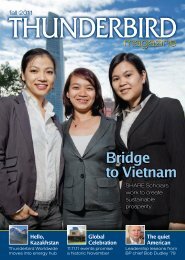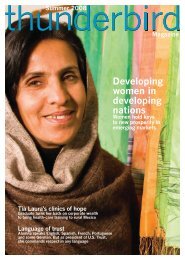Spring 11 MASTER.indd - Thunderbird Magazine
Spring 11 MASTER.indd - Thunderbird Magazine
Spring 11 MASTER.indd - Thunderbird Magazine
Create successful ePaper yourself
Turn your PDF publications into a flip-book with our unique Google optimized e-Paper software.
faculty focus<br />
ment of six dynamic organizational<br />
and managerial<br />
actions including stakeholder<br />
alignment with the<br />
aim of increasing complexity<br />
to such a point that not<br />
one single breach could<br />
create a threatening IP leakage<br />
situation — we call this<br />
keep it complex (KICX).<br />
Our IP protection framework<br />
(see illustration) is<br />
characterized by a dynamic<br />
combination of simple and<br />
complex, static and flexible<br />
activities and practices. It<br />
should be read from the bottom<br />
up.<br />
For effective IP protection<br />
in China, companies<br />
must have context-relevant<br />
corporate and business<br />
strategies; they must have<br />
identified the critical IP that<br />
is required to execute these<br />
strategies; they must identify<br />
the right people (internally<br />
and externally); they must<br />
explicitly formulate effective<br />
operational, management<br />
and contingency processes;<br />
and they must develop an<br />
explicit awareness of timing<br />
and its impact on the other<br />
factors mentioned.<br />
While these practices seem<br />
simple, more often than not,<br />
companies rush into China<br />
without considering these<br />
measures. We collected overwhelmingly<br />
rich evidence<br />
that this negligence usually<br />
leads to significant IP leakage.<br />
Incorporating IP protection<br />
tools and practices during<br />
the development of the<br />
business strategy provides<br />
the critical foundation upon<br />
which companies can build a<br />
robust IP protection strategy<br />
(KISS — keep it simple).<br />
Once companies have<br />
established this foundation,<br />
the focus shifts to a variety<br />
of managerial activities<br />
(KICX — keep it complex)<br />
A DYNAMIC MITIGATION AND ADAPTION FRAMEWORK FOR IP<br />
KICX<br />
KISS<br />
INTEREST<br />
ALIGNMENT<br />
that introduce on one side<br />
complexity and ambiguity —<br />
they can’t understand how<br />
you do what you do — and<br />
on the other internal and external<br />
stakeholder alignment<br />
as dynamic elements of IP<br />
protection. We identified six<br />
effective activities:<br />
1. Proactive interest alignment<br />
with regulatory institutions<br />
and individual<br />
government officials in<br />
the localities where the<br />
company operates.<br />
2. Disaggregation of IP components<br />
and core processes<br />
through organizational<br />
and physical separation<br />
of activities, vendors and<br />
know-how.<br />
3. Dynamism through<br />
continuously improving<br />
products and processes, in<br />
order to stay at the leading<br />
edge.<br />
4. Controls discipline that rests<br />
on a strong organizational<br />
culture.<br />
5. Strategic human resources<br />
management/talent management<br />
that makes the<br />
company a “great place to<br />
work.”<br />
6. Focused corporate social<br />
responsibility activity that<br />
makes the company a<br />
valuable, integral part of<br />
the local community.<br />
DISAGGREGATION<br />
PROTECTION<br />
DYNAMISM<br />
CONTROLS<br />
DISCIPLINE<br />
LEGAL FUNDEMENTAL<br />
KNOW YOUR CONTEXT: BUSINESS INTELLEGENCE<br />
CHINA STRATEGY CLARITY<br />
The key driver here is the<br />
complexity that results from<br />
combining these multilayered<br />
activities. The effect is a<br />
significant slowing down of<br />
both opportunistic would-be<br />
IP thieves (including departing<br />
employees, suppliers and<br />
customers) and organized IP<br />
theft through espionage.<br />
The use of socially complex<br />
processes, like talent<br />
management, extends the<br />
reduction of knowledge theft<br />
to the employee level, which<br />
is the most common conduit<br />
for IP leakage. Protection activities<br />
embedded in socially<br />
complex processes create<br />
ambiguity that provides<br />
a temporarily sustainable<br />
advantage.<br />
Finally, the more onerous<br />
challenge for multinational<br />
corporations operating in<br />
China is to remain dynamic<br />
by configuring and reconfiguring<br />
the elements of the<br />
framework as the context<br />
evolves, devolves or shifts.<br />
BEST IP PRACTICES<br />
In China, IP protection<br />
that goes beyond patenting<br />
and legal litigation is potentially<br />
the most important<br />
organizational capability<br />
for ensuring long-term performance<br />
in high-tech and<br />
SHRM-TALENT<br />
MANAGEMENT<br />
FOCUSED CSR<br />
service firms. This requires<br />
that companies employ<br />
three sets of best practices:<br />
• Get the fundamentals<br />
right, including strategy,<br />
deep contextual understanding<br />
and the use of<br />
appropriate legal fundamentals.<br />
• Develop and reinforce<br />
the six activities that are<br />
catalysts for dynamic IP<br />
protection.<br />
• Build a control-based culture,<br />
processes anchored<br />
in social complexity, and<br />
do this with speed.<br />
Andreas Schotter, Ph.D., is<br />
a <strong>Thunderbird</strong> professor of<br />
strategic management. Before<br />
embarking on an academic<br />
career, he was a senior executive<br />
with several multinational<br />
corporations. He has lived and<br />
worked in Europe, Asia and<br />
Canada.<br />
Mary Teagarden, Ph.D.,<br />
is a <strong>Thunderbird</strong> professor<br />
of global strategy and editor<br />
of <strong>Thunderbird</strong> International<br />
Business Review. She<br />
has lived and worked in <strong>11</strong><br />
Latin American countries, five<br />
European countries and eight<br />
Asian countries — in addition<br />
to the United States and<br />
Canada.<br />
thunderbird magazine 53

















